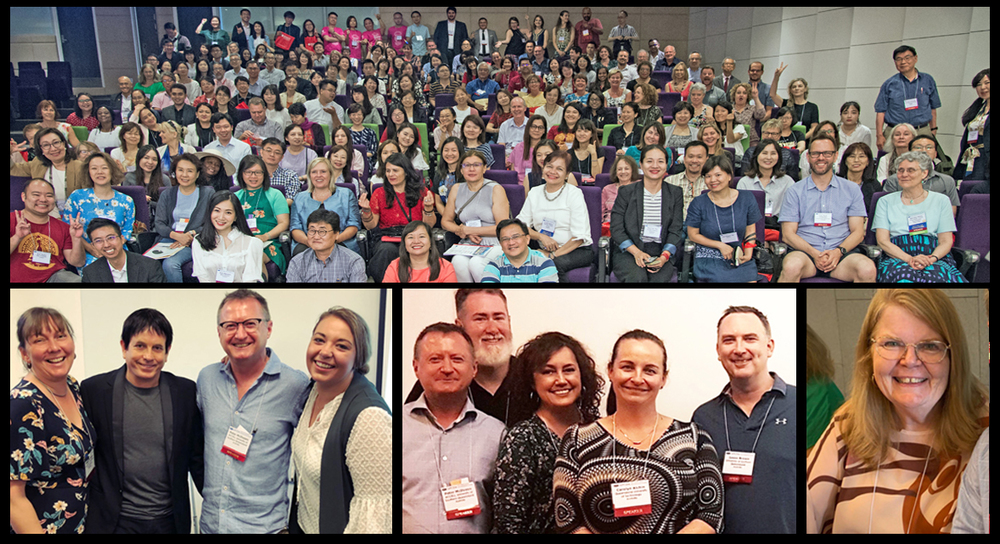Enhancing Local Career Services With a Global Perspective
06/08/19
Jennifer Luke is currently a PhD candidate and research member of the Australian Collaboratory for Career Employability & Learning for Living (ACCELL) and a Careers Educator/Practitioner at the University of Southern Queensland. With experience working with clients of all ages, Jennifer’s current research focus is on ageing and work, encore careers, skill retention within the workforce as well as meaningful and decent work from a global perspective.

In May of this year, I had the fantastic experience of attending and presenting at the Asia Pacific Career Development Association (APCDA) conference in Vietnam. The theme was “Navigating Career Development in the Age of Industry 4.0”.
Researchers, lecturers, practitioners and policy makers from throughout the Asia Pacific region (including the USA and Canada) converged on RMIT’s Saigon South Campus, for 3 days of sharing, exchanging and proposing solutions for successfully steering career development practices through today’s rapidly changing workforce landscape.
APCDA’s mission statement makes mention of inspiring career practitioners to deliver theory-based and research-driven career development services as well as promoting collaboration amongst career practitioners throughout the Asia Pacific region.
- Why is it important to understand issues and trends impacting international career services?
- Also, how does this relate to your local career services and clients?
Let’s look at an example of how a strong global perspective can assist you in understanding the needs of your local career service client base and community as well as build relevant career &/or workforce development programs.
Workforce disruptors – they are global and impact locally
Globalisation and technological progress are having a profound impact on both society and labour markets worldwide. We often read about these two disruptors with particular dramatic media emphasis on automation wiping out jobs and creating new ones. Another major disruptor though is demographic change, which includes a very significant issue – an ageing population.
At the recent APCDA conference, I had the opportunity to present twice. Professor Peter McIlveen led 2 symposiums involving many of us within the multidisciplinary research team of ACCELL. These symposiums focused on the theoretical, empirical and practical perspectives of employability and also rural/agricultural workforce development.
I also had the honour of co-presenting with Canadian career specialist Dr Roberta Neault on the topic of older workers, encore careers and retaining skills within the workforce. Together we provided a trans-Pacific view on these issues (Australian and Canadian) to show the similarities in our economies, regarding this ageing demographic disruptor. The enthusiastic response and ensuing conversations with many of our attendees, illustrated the similarities currently being experienced from the majority (if not all) of the Asia Pacific region.
Learning from each other
Many amazing informal discussions were held with conference attendees in regards to solutions to building age inclusive career services and how to influence government policy in regards to these issues around an ageing population and workforce development. Understanding the approaches by other countries and sharing ideas with each other, served to bring all of us under a global umbrella and highlight that our localised community issues were associated with the same global workforce trends.

Conference group photo (Top) courtesy of the APCDA. Other photos courtesy of the author. L-R: (photo1) ACCELL research team: Rebecca Black, Dr Chris Kossen, Professor Peter McIlveen, Kristen Lovric. (photo 2) ACCELL research team Professor Peter McIlveen, Michael Healy, Jennifer Luke, Carolyn Alchin, Jason Brown. (Photo 3) Dr Roberta Neault who co-presented with Jennifer Luke.
Search, gather, identify and contextualise global data
When providing community career development services as part of an organisation or in a private practice, it is important to understand who your target market is before building career interventions that will be both effective and provide positive long term results.
The capacity of career services to effectively address the needs of a diverse range of clients will depend upon the extent to which the career practitioner is able to understand both local and global job markets, workforce and social trends as well as the influences affecting their targeted community and client cohort.
These paragraphs are direct from the abstract submitted for the upcoming workshop that I will be facilitating at the CDAA National Conference this September in Canberra. The workshop title is “Big data and career development. Sourcing and contexualising data to develop and integrate successful career services in community”. Long-winded title for a workshop I know, so here’s what it is all about.
Everyone who attends will discover :
- Where to find international as well as Australian data sets.
- How to identify themes and trends within the data and then use this to tailor an effective career service to target client groups and community.
- These themes and trends will also assist in mapping potential stakeholders and collaborative networks both locally and global.
What will be found is that these data sets are not just workforce data but include socio-economic, educational, environmental and more. The 2030 Sustainable Development Goals by the United Nations will be a major influence.
I’m excited about seeing career services as an ongoing global collaborative project and I look forward to sharing ideas and collaborating with attendees at this workshop as well as throughout the upcoming 2019 CDAA Conference. See you there!
Use the hashtags #apcda2019 & #apcda19 on Twitter to discover more about the recent APCDA Conference.